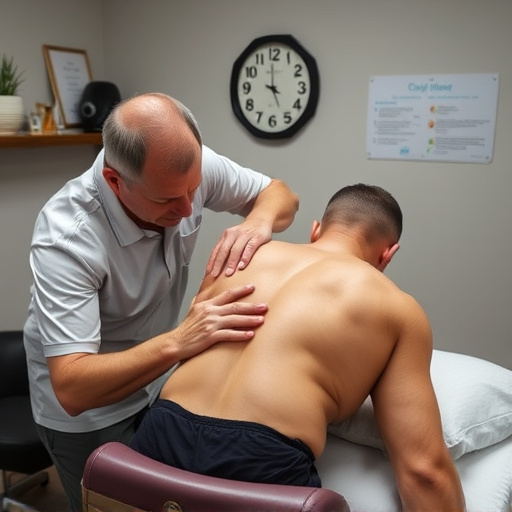Nutrition plays a vital role in optimizing recovery from occupational injuries by supporting muscle repair, bone healing, and physiological functions. A well-balanced diet with key nutrients like protein, omega-3 fatty acids, vitamins C and D, vitamin E, zinc, and magnesium enhances healing processes and improves treatment outcomes. Balanced dietary interventions combined with medical care and therapeutic exercises promote long-term function in occupational injury treatment.
In the realm of occupational injury treatment, nutrition plays a pivotal role in recovery. This article delves into the intricate ways diet supports healing and rehabilitation. We explore how specific nutrients facilitate optimal treatment outcomes and accelerate the body’s natural repair process. Furthermore, we present dietary strategies to promote long-term function and overall wellness, emphasizing the significance of nutrition as an integral component of successful occupational injury management.
- Understanding Nutrition's Role in Occupational Injury Recovery
- Key Nutrients for Optimizing Treatment and Healing
- Dietary Strategies to Support Long-Term Function and Wellness
Understanding Nutrition's Role in Occupational Injury Recovery

Understanding Nutrition’s Role in Occupational Injury Recovery
Nutrition plays a crucial role in supporting the recovery process for occupational injuries. In the aftermath of an incident like a car accident injury care, proper nutrition can significantly impact healing and rehabilitation. Adequate intake of essential nutrients facilitates muscle recovery, bone repair, and overall physiological functions vital for functional rehabilitation. A well-balanced diet ensures that the body has the necessary building blocks to rebuild and restore damaged tissues.
When addressing occupational injuries, a holistic approach that incorporates nutritional support alongside medical treatments can optimize outcomes. This involves ensuring adequate protein intake for muscle repair, consuming nutrient-rich foods to support immune function, and meeting caloric needs to fuel the recovery process. By focusing on balanced nutrition, individuals can enhance their body’s ability to heal, leading to improved mobility and a smoother transition towards full recovery.
Key Nutrients for Optimizing Treatment and Healing

When it comes to optimizing recovery from an occupational injury, certain key nutrients play a pivotal role in supporting both treatment and healing processes. Adequate intake of protein is essential for repairing damaged tissues, including muscles, ligaments, and tendons. Amino acids, the building blocks of proteins, are crucial for building new cells and promoting tissue regeneration. Omega-3 fatty acids, often found in fish oil supplements or fatty seafood, have anti-inflammatory properties that can help reduce pain and swelling associated with occupational injuries such as herniated disc treatment or neck pain relief.
Additionally, vitamins C and D are vital for enhancing collagen production, which is necessary for strengthening connective tissues. Antioxidants like vitamin E and certain minerals, including zinc and magnesium, act as powerful allies in the body’s natural healing mechanisms by neutralizing harmful free radicals that can impede recovery. Incorporating these essential nutrients into your wellness care routine can significantly contribute to a faster and more efficient occupational injury treatment journey.
Dietary Strategies to Support Long-Term Function and Wellness

A well-balanced diet is a cornerstone in the long-term management and recovery from occupational injuries, especially those involving soft tissue injuries. Adequate nutrition supports muscle recovery and promotes the overall healing process, complementing therapeutic exercises. Essential nutrients like proteins, vitamins, and minerals play pivotal roles in repairing damaged tissues, enhancing immune function, and reducing inflammation. A diet rich in lean proteins, whole grains, fruits, and vegetables ensures the body receives the necessary building blocks for tissue repair and optimal function.
Incorporating dietary strategies such as timing meals around therapeutic exercises, consuming a carbohydrate-rich diet to fuel physical activity, and ensuring adequate hydration can significantly impact recovery outcomes. Additionally, anti-inflammatory foods like omega-3 fatty acids found in fish and certain herbs may help manage pain and swelling associated with occupational injuries. These dietary interventions, when combined with appropriate medical care and therapeutic exercises, can foster a holistic approach to recovering from work-related injuries, ultimately improving long-term function and overall wellness.
Nutrition plays a vital role in supporting individuals recovering from occupational injuries. By understanding how specific nutrients facilitate healing and optimizing dietary strategies, we can enhance long-term function and overall wellness. Incorporating key nutrients and adopting effective dietary practices is essential for a successful recovery journey, ensuring individuals return to their active lifestyles with improved strength and resilience.














